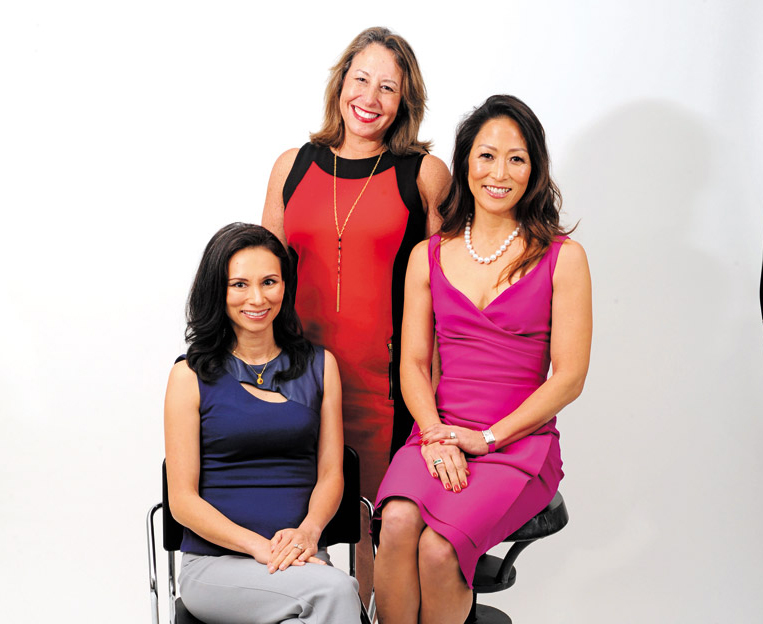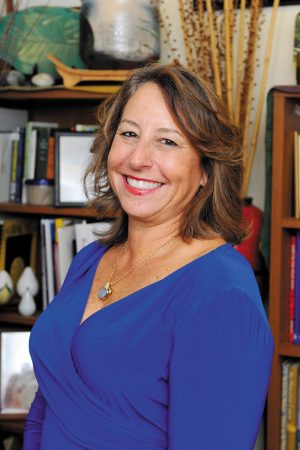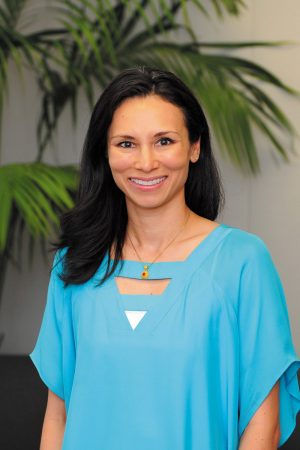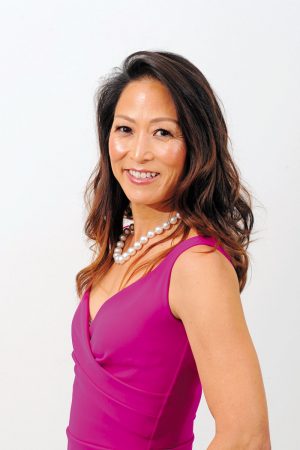G.I.R.L. Power

(Clockwise, from left) Alicia Moy, Catherine Camp and Denise Hayashi Yamaguchi
As this year’s Girl Scouts of Hawai‘i’s Women of Distinction honorees, Catherine Camp, Alicia Moy and Denise Hayashi Yamaguchi are proving what it means to be a G.I.R.L. — Go-getter, Innovator, Risk-taker and Leader.
Now more than ever is an exciting time to be a G.I.R.L. — a Girl Scouts G.I.R.L., that is.
It stands for Go-getter, Innovator, Risk-taker and Leader, and is part of a platform that encourages Girl Scouts to pinpoint their strengths and reach their highest potential. It’s about helping strong girls transform into powerful women of Courage, Confidence and Character —and it seems to be working, too. According to national data, 80 percent of Girl Scouts have a stronger sense of self, compared to 68 percent of girls who do not have ties to the organization. Girl Scouts also are more likely to graduate from college, vote, advocate for the environment, and engage in community service as adults, just to name a few.
“I think maybe people feel we have a leadership void and are concerned about the future,” says Shari Chang, Girl Scouts of Hawai‘i CEO. “Girl Scouts is preparing young girls to become future leaders with the characteristics that are respected: the willingness to speak up and advocate for other people, the courage to lead during difficult times, and the ability to be innovative and to take risks to make the world a better place.”
It’s rather appropriate then that this year’s Women of Distinction honorees — selected by an independent committee for their leadership and commitment to community — embody what it means to be a G.I.R.L. They are Catherine Camp, Alicia Moy and Denise Hayashi Yamaguchi.
While each woman comes from a vastly different background, they do have one thing in common: Each serves as a living example of the possibilities Girl Scouts may aspire to.
Plus, as Chang puts it, “they have some real interesting stories.”
CATHERINE CAMP

No one would ever claim that Catherine Camp is anything but a risk-taker. In fact, it is the very thing that defines who she is.
As just a sophomore in high school, Camp began taking college-level courses at Carnegie Mellon University. That feat pales in comparison, though, to the degrees in math, economics and chemistry, and master’s in business administration and health care administration, that she ended up with.
Her tenacity didn’t stop there, either. After 10 years of working in the health care industry — she spent some time at Kaiser Permanente and Kapi‘olani Medical Center for Women & Children — Camp shifted gears. Planning for doctor’s offices and new MRI units has proven to be a very different task than building a shopping center, but none of it, says Camp, would have been possible without a little gamble — and she hopes other girls can experience something like it, too.
“I really, really wish for young women and girls in high school and in school to see that they can do more than what they think of,” she says. “I would never have thought in high school that I would be going to college … I took the risk and said, ‘Why not?'”
She has been with Kamehameha Schools now for about 11 years, and currently serves as director of planning and development for its Commercial Real Estate Division. In this role, Camp oversees projects from start to finish, and has worked on everything from renovations at Windward Mall to the Rainbow Vista apartment units in the university area. Her current projects include a 100-acre master plan in the Kapālama area that will take into account transit-oriented development, and a redevelopment of McDonald’s in Kāhala, where Kamehameha Schools also plans to build a retail and restaurant center.
It’s a job that changes daily, and while she may not be putting all her degrees to use, it does allow Camp the opportunity to merge her passion for numbers with her love of people. Which is why, as busy as her job keeps her, Camp also finds time to work with organizations such as Child & Family Service, NAIOP (a commercial real estate development association), Pālama Settlement and Girl Scouts of Hawai‘i.
“I’m a numbers person, but I’m a people person,” she says with a laugh, “Most people are all numbers or all people, but I tend to like both.”
And while she wasn’t a Girl Scout growing up — Camp says it wasn’t an option, as her family was poor — she certainly wishes she had been one.
“I would have loved to,” she says. “Girls can do it. They can do anything a guy can do, and they can do it better, for sure.”
Alicia Moy

Working in investment banking in New York, Alicia Moy never stopped to think about how her industry was dominated by men. She just worked hard and had fun doing it.
Along the way, Moy picked up mentors, male and female alike. One in particular would have a hand in changing the course of her career, when he suggested that it was time Moy get new tools for her toolbox, as she recalls him putting it.
“Very male sort of analogy, but I got it,” she says with a laugh. “At some point, you’ve sharpened that tool so much that it doesn’t need to be sharpened anymore, and so it was time to branch out and try new things.”
As fate would have it, Moy was senior vice president at the time at Macquarie Infrastructure Co., which acquired Hawai‘i Gas in 2005-06. In the years that followed, Moy became acquainted with the company, joining its board of directors in 2011. So when the opportunity to take the reigns at Hawai‘i Gas presented itself, Moy took it.
She has been president and CEO of Hawai‘i Gas now for almost five years, and has some pretty lofty goals for its future. While the company may be more than 100 years old, gas as a source of power is still relatively new compared to the electric industry, for example. The hope, therefore, is to ensure that Hawai‘i Gas has a “more resilient, diversified fuel supply that also has a lower carbon footprint than it has today,” according to Moy.
To do that, Hawai‘i Gas is spearheading a new initiative she estimates should come to fruition by the end of the year. The company plans to take gas from the city’s Honouliuli Wastewater Treatment Plant, clean it and use it, making it the first stream of renewable natural gas in Hawai‘i’s pipeline system. Hawai‘i Gas also will be focusing its efforts on pilot projects involving energy crops.
Hawai‘i Gas is not all Moy devotes her time to, though. Her work in the community is extensive. She currently serves on the boards for Bank of Hawai‘i, Aloha United Way and Chamber of Commerce Hawai‘i, and is involved with Hawai‘i Business Roundtable, Young Presidents’ Organization and Military Affairs Council, to name a few.
So to look back on her career and see where she’s at now, Moy finds that G.I.R.L. certainly resonates with her experiences. It is, after all, what brought her to Hawai‘i in the first place.
“You have to have those attributes, I think, to really take a leap of faith,” she says. “You have to believe in yourself that you can do these things. Having that confidence is something that comes from inside, and being able to overcome those voices inside are the things that I think can really set people apart.”
Denise Hayashi Yamaguchi

Seven years ago, chefs Roy Yamaguchi and Alan Wong joined forces with Dean Okimoto and Denise Hayashi Yamaguchi to establish Hawai‘i Food & Wine Festival. Much of that stemmed from a desire to showcase Hawai‘i’s agriculture and food, but ultimately, the group hoped it would evolve into a destination-driven event that could support the state’s tourism industry, too.
Initially, Hawai‘i Agricultural Foundation, which Yamaguchi joined around the same time as its executive director, hosted the event. But as Hawai‘i Food & Wine Festival continued to grow and their vision became reality, Yamaguchi, who also is its founder and CEO, chose to keep the two entities separate. Hawai‘i Food & Wine Festival is an event of its own accord, while Hawai‘i Agricultural Foundation works with farmers and the community.
Among its many initiatives, Hawai‘i Agricultural Foundation has 220 acres of land in Kunia on which a variety of farmers grow roughly 5-acre plots. The organization also offers a CSA (community supported agriculture) program that gives subscribers locally sourced produce, along with information about its origins and suggested recipes.
But perhaps its biggest focus has been the work it does with students in grades K-12. Among them is Veggie U Hawai‘i, which teaches fourth-graders about farming through hands-on STEM lessons, and Where Would We Be Without Seeds that examines the fundamentals of agriculture. All of it, says Yamaguchi, is intended to pique an interest in agriculture among youth.
“There are so few kids that want to go into agriculture today,” she says. “The average age of a farmer on a national scale is 60 years old, and it’s the same in Hawai‘i. So unless we start to build the next generation of farmers, although we have land and water and everything else, we won’t have agriculture.”
In addition to supporting Hawai‘i’s food security through these efforts, Yamaguchi also works with East-West Center and Hawai‘i Tourism Authority, fulfilling a desire to give back that she picked up while working in Washington, D.C., with late U.S. Sen. Daniel K. Inouye.
“I really learned a lot in D.C. about public policy and about how policy can affect change,” she says.
Yamaguchi was never a Girl Scout either, but did serve on its board for a few years a while back, supporting an organization she believes is vital for the next generation of women.
“There’s so many messages that keep us in the box — that women should be a mother, women should be this, women should be that or even the fairytale stories that we’re told; Prince Charming is going to save you,” she says. “I think organizations that help girls, young girls, think beyond that and start to help change the story about what women can be and who they are, are critically important to gender equality.”
This year’s Girl Scouts of Hawai‘i Women of Distinction will be honored March 9 at Hilton Hawaiian Village Waikīkī Beach Resort. For more information, visit gshawaii.org.






